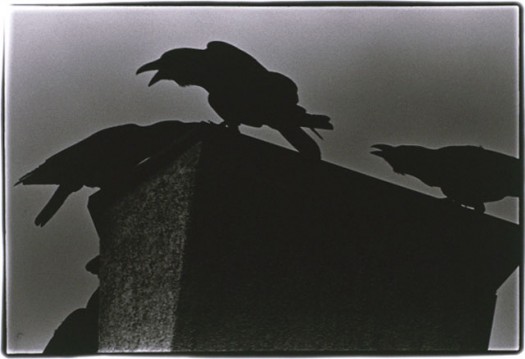
Masahisa Fukase
“The exemplary person (junzi) seeks harmony (he) rather than agreement (tong); the small person does the opposite.”
Confucius
“All the consumable time of modern society comes to be treated as a raw material for varied new products which impose themselves on the market as uses of socially organized time.”
Guy Debord
Henry Giroux said there is a war on communal relations, on solidarity, and the imagination. I sense this every day when I read mainstream media. Not just the bought hacks who write the disinformation about world affairs, or whitewash U.S. foreign affairs, but even the cultural matters, the human interest (sic) stories and then to read comment threads is an experience akin to choking on your own vomit. This war on communal solidarity has affected an entire population. From top to bottom. I read comment threads in black papers, corporate but aimed at black audiences, where Bill Cosby will be heartily defended. Where Russell Simmons is defended. I read the corporate hipster organs like Vice and Gawker, and find stunningly openly fascistic rhetoric and the most almost royalist values on display. Or liberal papers like Guardian, where vixens of Empire hawk their gonzo racialist apologia for the new Imperialism, the sexy Imperialism (Laurie Penny, “Obama is so sexy”), and Penny, like Molly Crabapple, and like the court eunuch, Richard Seymour, there is a blathering stomach turning F E A R that runs through all of it. FEAR. Cowardice. Fear of jobs, fear of brand erosion, fear of style lag, and fear of, bascially, the totalitarian surveillance state which slices like a cheap razor across the cultural stubble of the electronic cyber world. They basically will take a collaborator position couched in the syntax of cool. All the road kill on the information highway is now piling up. And we are reaching endgame. One senses the U.S. state department, the Pentagon, the Joint Chiefs are all increasingly blinkered to the reality around them. Like saggy assed old men in speedos, unaware their potency was lost long ago. There is method in their madness, of course, but there is also just madness.
Culturally, the new corporate media of places like Vice, or Dead Spin, and Grantland, or even the Nick Denton Gawker blog empire, are driven by a particular hysteria, a particular panic that is born of a reality, a daily existence, so enclosed and so mediated by power and authority and rules and laws and the psychic prison cell of solipistic pop ephemera that each thought is painful. Each fetid and wheezed breath is forced out to further revenue and readership and click-baity news items.
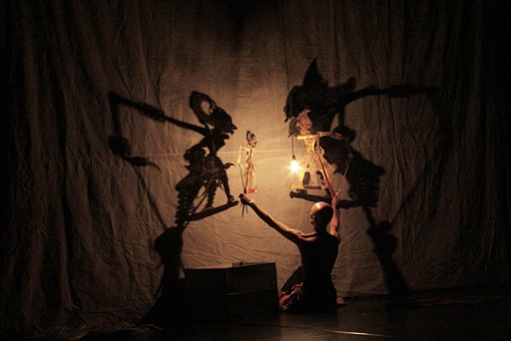
Mugi Wayang (shadow puppet) Co. Jakarta
That even such a word exists is profoundly depressing, actually. None of these corporate entities, media outlets, ever writes anything of a serious nature. Everything is designed for easy consumption, for banality, and with a fair amount of prurient titillation. Obama signs away human life, awards blood money to the onwership class ghouls, and yet, pseudo left journalists describe him as “sexy”. Think about taking the time to write that. Think about the logic at work.
http://blog.foreignpolicy.com/posts/2014/03/28/can_vice_make_news_hip
Culture and politics, or at least the presentation of politics, have merged. Politics are entertainment. They are thought of as a movie, for the most part. Violence is expected in movies. What is perhaps more troublesome, however, is the trivializing of the entire culture. The validation of taking pride in one’s immaturity. The consciousness of, I think, a majority of the U.S. population, and probably a clear majority of those under thirty five, has created intellectual mechanisms to fuse and synthesize categories of experience. Watching Vice TV specials becomes the same as critical theory, and the same again as fictionalized History channel specials, and the same too with kitsch science fiction. I am not sure Battlestar Gallactica is percieved much differently than, say, 60 Minutes.
“Reception in distraction, which is making itself felt with increasing emphasis in all areas of art and is a symptom of deep transformations of perception, has its central place in the cinemas. And here, where the collective seeks its distraction, the tactile dominant that is reorganizing apperception, is hardly absent…nothing reveals more clearly the tremendous tensions of our time than that this tactile dominant is asserting itself in the optical realm.”
Walter Benjamin

Jacob Epstein
1913
Benjamin of course saw urban life itself as historically linked to war and danger. That urban concentrations of people were reproducing a kind of political danger. He went so far as to say that film corresponded to this real danger of urban life, a life he was experiencing as authoritarian. For indeed, it was. The most intriguing aspect of Benjamin on film was an off handed remark that singled out the nature of film acting. Acting by habit, is how he described it. He never elaborated on this, for his concern was, at the time, with the optical unconscious. But there was an implication, I believe, with how this habit, the indifferent activity of performing for a salary, was qualitatively different than acting as practice. In the context in which he wrote that sentence, Benjamin was actually emphasizing the progressive aspect of this. I suspect Benjamin wasnt clear in his own mind about the nature of rehearsal, or of the intricacies of performance in general, but there is an artifical and probably wrong division made between reflection and contemplation, and action. And some confusion regards how optical perception and the role of the “expert” interact. This is all part of a long essay by Benjamin that focused on physiognamy; mind and body, really. The implications of this remark wasnt really his concern. My point has to do with this intuited sense of acting out of indifference, even hostility or something like self disgust. The sense of focused attention, the craft or practice of ritual performance somehow, is lost … and it is lost amid this increasingly unstable urban world (speaking the late 1930s) or today, in the land of hyper-branded screen reality. That the sheer volume of these ambivalent and mediated performances has an effect. I spoke with a teacher here in Norway (well, my wife did, actually) who mentioned the increasing problem children had learning simple acts of balance and recognizing physical weight, material characteristics out in the world due to excessive time in front of a screen. In other words, a surfeit of actual play in the outside world. Now this sense of lurking danger, and of neurotic repetition, instead of the repetition of mimetic process, is I think, connected to this new seamless rise of fascist values. The body of the indifferent narcissist actor becomes iconic.
Now this line of thinking is periously close to occult, and Benjamin was guilty to a degree of this, too (as Adorno reminded him). Still, there is something hugely important in examining the trivialized and infantile culture of 21st century American entertainment, and the growth of brutal and vicious domestic police force, the turning of the urban landscape into a laboratory of violence.
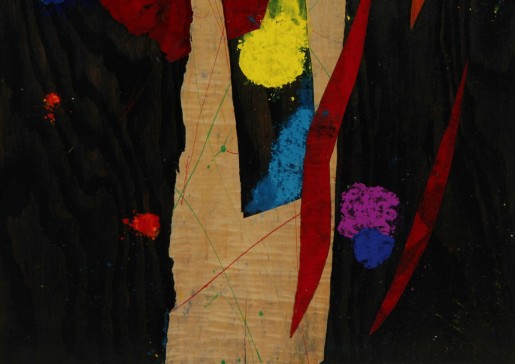
Sam Francis
Frederic Schwartz, in his really outstanding study of 20th century German aesthetics, Blind Spots, spends a good deal of time discussing Adorno and Benjamin, and takes pains to disintangle the distinctions between Ausdruck, and expression. In English translations there is no distinction made, and this has led Jameson and others to criticize Adorno’s opaque definition of mimesis. For the purposes of this posting, the distinction goes like this: Ausdruck is the non subjective in the subject. It is objective without having to be correct and its meaning usually does not correspond to the subjective psychic state of the individual. ‘Expression’ is the reflection of those subjective states that is NOT objective, and thus not within the realm of art. Ausdruck is transubjective. It is in theory the bridge between subject and object, and the form of knowledge peculiar to art. It is seperate from psychology and Adorno implied it may once have been conscious in the world but survives in a new form in art. In a sense, for me anyway, this comes as close as one can come to explainging the ineffable fleeting trace of the past, or history, in art. The photos of Ravens by Fukase (see below) trigger something in us, some strange recognition of omens and mourning, of grief, suffering, and it is something that cannot be conceptualized. And the failure to examine this is the result of instrumental thought having eclipsed all culture, and having led humanity to this new nearly global fascist state.
Ausdruck is a subjective state, as Schwartz says, that is turned into an objective form without being reified. Expression remains simply subjective. Kitsch is reified expression in other words. Expression is regressive, and leads back to myth (the Adorno idea of backward myth) while Ausdruck is a form of knowledge. This is pretty much what Jan Kott and others have described as theatre. A form of thinking, of knowledge. This is the progressive aspect of ritual.
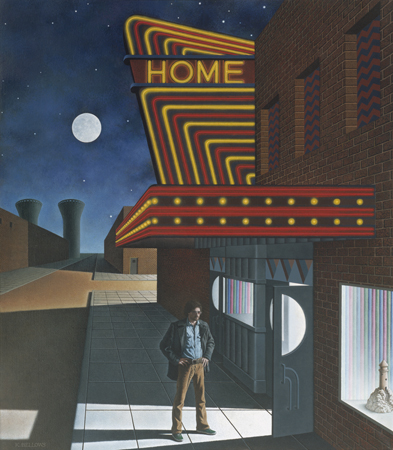
Kent Bellows
“This leads to a subjective paradox of art; to produce that which is blind.”
Adorno
This is really the core of Adorno’s ideas on form. The blindness of the sense of form is a necessity in the object, it is in opposition to rationality and order, and most significantly, this aporia of mimesis breaks down the distinction between self and other, and divests the relationship between them of domination. The instinct to dominate the other is subsumed. This is the liberation embedded in art.
As Adorno said: “Artworks are self likeness freed from the compulsion of identity.”
The cultic status of identity in today’s culture, of subjectivity as a brand to be constructed through shopping at lifestyle bazaars, leads inescapably toward an aesthetics of authority, of vanity and amnesia. Or more, to a false history. This aesthetic is exactly what is at work in pop journalism from Gawker and Vice, to Molly Crabapple and Laurie Penny, to the Oscars and corporate TV. It is all based on the same regressive return to colonialism, anti semitism, racism, and authoritarianism. There is an undeniable link, I think, between instrumental thought, kitsch films and narratives that erase memory, and even to Barbie dolls and steroid growth hormone physiques; airbrushed versions of the human body (most acutely in women, but in both genders, really) and the gradual clear loss of grace in movement that one sees in daily life. The conditioning that comes with reading Vice or Buzz Feed, or Huffington Post even, is one that is far more reactionary than I suspect most people, even on the left, would think. And the readers themselves usually describe this stuff as liberal.
Now, Nick Denton (another Oxford grad, gay, and deeply reactionary) advertises himself as very liberal (and sexual identity is no small factor in this), while Jonah Peretti the founder of Huffington Post and Buzz Feed, is also deeply reactionary, a millionaire, and graduate of MIT, and Kenneth Lerer, another media magnate, co founder of Huff Post and managing editor of Buzz Feed, and also a millionaire, and we could on, but if one looks at what passes for liberal media, what you get is actually rather profoundly reactionary organizations. From giant telecom corporations to relatively minor blog empires (still generating six figures easily each year) the vision remains much the same. Arianna Huffington, who began Huffington Post in 2005 as an expansion of her first internet site, Resignation, which was founded to give voice to those wanting Bill Clinton to resign, and was the voice of ultra conservatives before re-purposing and re-branding as the voice of liberals and Democrats, finally sold Huff Post to AOL for 315 billion a couple years ago, is an opportunistic vampiric presence in media, but one who while on occasion can hold a progressive opinion, in the end is a Capitalist, and one that travels amid the rich white folk of her class. The point is, media is controlled by rich white people with expensive educations from expensive elite Universities, who are not likely to tolerate social change that might take some of that money away from them, some of that privilege. They are racist, but paternalistically so. They dont really like Arabs unless those Arabs attended University, too (or carry their bags). They don’t really like the poor, because, well, they’re so poor. Deep down, or even not so deep, these are all people who are scared by anyone unfamiliar to them at the country club, or golf course, or hip trendoid restaurant or gallery or auction house. When they travel they travel first class, they stay at five star hotels, and they effectively cut themselves off from the people of wherever they go.
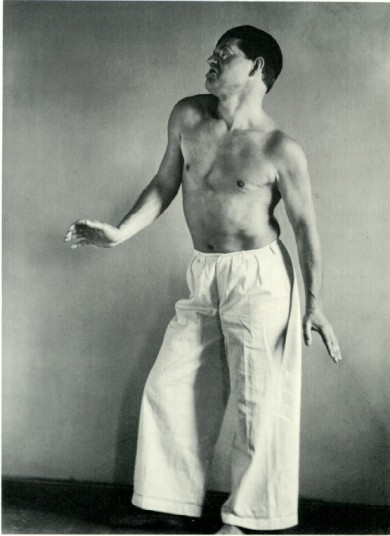
August Sander, photographer
I am reminded of the treatises of Zeami, the ‘father’ of Noh Drama, in Japan. I recently wrote something about theatre in Los Angeles, for Stage Raw, a small publication that covers theatre in So Cal. I thought again about the teaching of playwrighting. The teaching of aesthetics in general, but specifically about writing. How many young playwrights have read Zeami? I’d be willing to bet almost none. I doubt that many have read very much at all, but its curious that if one chooses to be a writer, one doesn’t have the curiosity to discover this stuff. And how many MFA programs for creative writing would insist on reading Zeami, or for that matter even have a reading list? I wonder. I know a number of very good young writers who do demonstrate a unquenchable curiosity, but I feel they are a decided minority.
Zeami was a Buddhist, and a devout believer in harmony. He thought ritual pacified the demons that plagued the populace. But pacify through awakening, and harmony. Not through numbness. One interesting aspect of Zeami was his extreme sense of secrecy. This is probably worth an entire posting, actually. Zeami saw the arts, and acting, as almost monastic undertakings. He cautions against pandering, against the desire to flatter the audience. The desire for applause!
Zeami uses the word hana, which is translated various ways, but usually as essence or literally as flower, or the scent of a flower, or bloom. Zeami Motokiyo was born in 1363 and died in 1443. The actor in Noh was, in a sense, a priest class, initiates in the secrets of this ritual theatre. Interestingly, the texts of Zeami were only discovered in 1908 (having been kept in private hands for centuries) and the definitive texts only published in 1940. The teachings of the flower, or transmission of the flower were designed as meditative practices connected directly to nature, to the physical world. There is a variety of interpretation involved in translations of Zeami, and one concept needs to be clarified. “Yugen”, which literally means grace, but here is connected to mimetic practice. The vulgar translations tend to think of it as ‘role playing’, but obviously it is not that at all. Its meaning is really ‘darkness’ and ‘mystery’, in connection with mimesis. The beauty and mystic element in performance, for the Noh actor, lies in witholding. I have always thought that the translations of Aristotle, and the interpretations of the Poetics, to be widly reductive. I suspect the western translations of Zeami do much the same thing. Now, beauty itself, in Japanese aesthetics is always mediated by effacement, and by discretion. This is the basis, in fact, of the tea ceremony. The aesthetics of wabi. You see this in Chinese painting of the classical period. The idea of beauty is processural. There is no ‘realism’ per se, there is only ritual. Noh drama is a theatre of dance and song. But those terms have different connotations in Japanese thought than they do in Western thought. Now, there is debate about the influence of the Tokugawa shogun, in the 1600s, who removed Noh from the daily culture of the people. I suspect that this actually did little to the actual essence of the discipline, but it no doubt formalized the canon.

Kalimba, Chinese built and unfinished living complex, Angola
Zeami carefully delineates the ways to prepare for certain roles. The most significant is the role of a dead person or ghost (usually a warrior), and these are close to, but distinct from, the roles of insane people. He described the playing of a demon as a “flower blooming from amid the rocks.” The point here (and I will post more, I think, on Noh Theatre soon) is that what is taken as naturalism in the West, in the U.S. in particular, is actually the reproduction of the dominated body. In Noh, the ritual subsumes the question of even narrative, for everything is connected to a primordial tragedy, a grave meditation upon mortality, and, more, on secrecy, or the hidden or secret meaning of life. If one doubts the profoundly simplistic and regressive aspect of arts education today, just google Theatre, theory and curriculum and see what you get. Stunningly stupid material, there is no other description. What is removed are all things of any weight or gravity, anything not ready for quick consumption. There is a simple formula, usually sociologically based, superficial and geared for easy grading. Nothing is quite so depressing as mid level academia today (and honestly, I suspect there are a handful of good departments at various Universities, but over all, the landscape of Academia even at elite schools is pretty sad). The Noh Theatre is ceremonial rhythms, and movement, ritualized, repeated, and always inward looking, in the service of philosophical questions. It is a sort of manifestation of hiddeness. That hiddeness, however, is not psychological. It is metaphysical, or meta psychological, and maybe, in this context, that is what spiritual means.
There is nothing sentimental, or ironic. This austerity eschews any desire to entertain. Zeami wrote about audiences, and was concerned with their pleasure, but it was a very specific pleasure, the contentment of harmonious thought and being. Balance.
Now if one wanted an example of what Hollywood encourages in their workshop culture, here is a sample (and I hope this is only marketing, and not REALLY what they believe, but it might be). A friend sent this to me in disgust, and its rather perfectly encapsulates the sensibility at work.
http://blogs.indiewire.com/sydneylevine/latinobuzz-5-tips-for-screenwriters-from-a-feature-film-program-fellow#

Rackstraw Downes
This is creative writing advice for a fourteen year old, and really, a smart fourteen year old would laugh in derision. But its quick fix writing for sub literates. Make it about ME, and find a few recipes or formulas so I can write about ME. But this fits seamlessly with the prose of Mother Jones, or In These Times, or New Statesman, et al. Recently Mother Jones ran a piece about artists performing for dictators. Now, Steven Segal was taken to task for hanging with Putin. Segal is a near psychotic piece of self parody, but hanging with Putin? That’s his crime? And this is how we define dictator at the “leftist” Mother Jones? No mention was made, by the way, of Beyonce or The Rolling Stones performing in Israel, and no mention was made of about a million corporate deals with death merchants and their Madison Avenue henchmen. No, just a few “amusing” pieces about threadbare third world despots (most of whom are clients of the U.S.) and done in a wildly Orientalist prose. And where U.S. foreign aid, military sales, or training to these dictators would actually be interesting, we get only an Ivy League version of TMZ. The coverage of Russia and the Ukraine election was treated by a default subject position, as ‘just what Empires do’. Venezuela is always referred to as a ‘regime’, while the U.S. is never so described. Nor the UK, nor Germany, or anyone else in the EU. No, only this racist prose that equates the southern hemisphere as a land of banana republics and dictators in aviator shades.
The Vice and Gawker empire, and their imitators, are targeting the youth market. Now the ‘youth market’ today includes forty five year olds, but never mind, and the writers tend to sound like frat boys, almost always WHITE frat boys, and they are part of that same frabric of snide you hear echoed in a show like Girls. One article I read about the Harvard Library discovering books bound in human flesh began with this sentence:
‘There is something undeniably creepy about big expansive libraries…’. This is the tone adopted in most of these lifestyle blogs. Attitude as a substitute for style. The truth is the U.S. is closing most of its libraries, and the resource of free libraries for the poor is dying because of those cut-backs. But never mind, lets not let an actual perspective and social reform get in the way of my snark. And anyway, big expansive libraries are wonderful and magical, not creepy. Now this is not insignificant, because aesthetics and politics, all run together and those who read Molly Crabapple at the ‘liberal’ Guardian are the same ones think Chevy Chase movies are just the funniest and think Gravity is a masterpiece of filmmaking, think Harold Ramis is a genius, and think Dave Eggers is a great prose stylist, and…. will by accumulation, if nothing else, become the Good Germans of the new American feudal state.
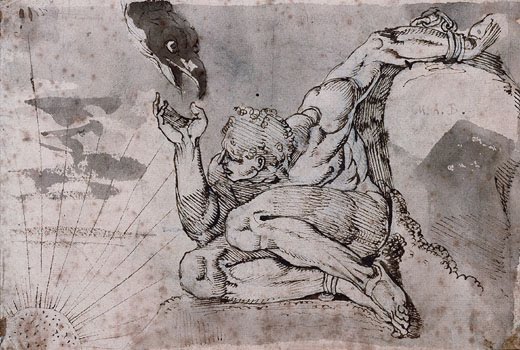
Henry Fuseli, Prometheus, 1770
The top photo is by Masahisa Fukase, perhaps among the very most important photographers of the century despite a relatively small body of work. Fukase was born in Japan in 1934, placing him in the center of Japan’s lost generation. He led a troubled brooding melancholy life and despite some commercial success, his fatalistic vision darkened as time went on. When his marriage fell apart, Fukase returned home to Hokaido by train. He noticed ravens collecting at the train stations and gradually became fixated on these dark harbingers from Japanese mythology. His last book, “Ravens” (in English now, The Solitude of Ravens) is as mesmerizing as any single book of photographs I can think of, and not long after publication, the despondent Fukase, drunk, fell down a flight stairs and into a coma that would last for twelve years until his death in 2012. Greg Fallis wrote:
“These photographs of crows and ravens most definitely do not fall into the category of wildlife photography. Fukase’s approach emphasized the eldritch power of the birds. The images aren’t really about the birds as birds, but as visual representations of the photographer’s emotional state. In spirit and form, the photographs resemble traditional Japanese sumi-e, an ink and wash art form famous for its stark style. The birds—and even the non-bird figures—look as though they were sketched with the same sort of intensity of purpose used by the practitioners of that art. Masahisa Fukase
Ravens, by the way, occupy an intriguing place in Japanese mythology. They belong to a class of supernatural creatures called tengu. These beings are often portrayed as disruptive spirits, harbingers of evil times. Even those tengu which are sometimes protective of people are also considered unpredictable and potentially dangerous.” Fukase’s other work varies, but his final book, and some of the late photos (many are of groups of people, often engaged in mysterious activities, who feel as if called forth from the underworld), are works of genius. These photos are full of portents, and their singular tragic totemic quality allows one to consider the very triviality about which I began this post.
http://www.theguardian.com/artanddesign/2010/may/24/masahisa-fukase-ravens-photobook

Masahisa Fukase

Reminds me of all those so-sincere-so-refined critics lauding “Captain America 2” as a thoughtful examination of the surveillance state. What the…? If there is a message in that movie’s vacuousness, and I believe there is, it’s the same reactionary message as all Hollywood superhero blockbusters: the only way to defeat a secret conspiracy out to destroy our country is to hand it to a bunch of powerful individuals (superheroes) with no accountability. Of course these superheroes all turn out to have a Conscience and Do The Right Thing, but whatever. And a facile, childish film fools grown men/women into thinking it’s a thoughtful critique of anything, just because in the film’s fictional universe the characters pay some lipservice to the idea that SHIELD might have gone too far in its surveillance? (And actually there’s a lot of interesting hidden political messages — all of it only faux-progressive and really actually regressive — in the whole SHIELD-is-infiltrated-by-Project-Hydra subplot, and I could analyse that in detail, but I don’t know if that sort of geekery is appropriate in this thread)
So, yeah, I think that’s just one of pop culture’s many instances that proves your thesis here.
Also, WTF is this…? http://www.nytimes.com/2014/04/03/fashion/normcore-fashion-movement-or-massive-in-joke.html
Can anyone enlighten me?
you know actually Exir, there are probably pretty impressive implications to ‘normcore’. As for superhero franchises, its astounding, because its a closed system. Oh, SHIELD…..its geekdom and its insular and its so inside its not inside, and etc. But at the foundation of it, its fascist. Vigelante violence…..demonized segments of the populace….worship of authority.